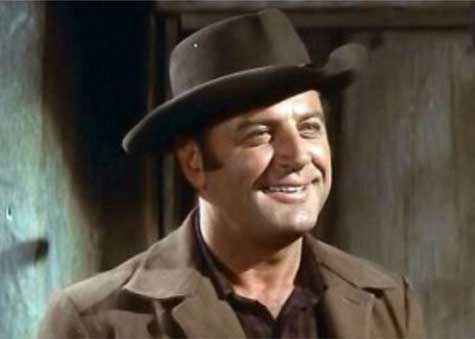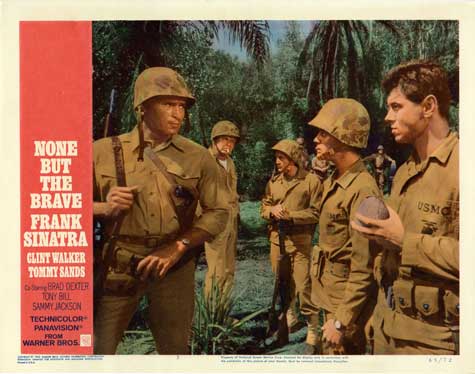
Brad Dexter has evil eyes. There are a lot of guys who have that whole hollow-on-the-inside steely-eyed-gaze thing going on in classic noir, but no one does it better than Brad Dexter. To catch up with him in some of his classic roles is to stare down the barrel at a man who simply does not care about anything but himself.
He’s probably best known today as one of the gang in The Magnificent Seven —though he once remarked, and not incorrectly, “I’m the one from The Magnificent Seven that no one remembers.” One of the reasons he got lost in the shuffle of the big stars of that film is because he had never been a big star, nor did he go on become a star. He was simply dependable Brad Dexter.
He was born Boris Velijko Milanovich in Goldfield, Nevada, the child of Serbian immigrants. Tall and brawny, in his youth he worked as a meat packer and an amateur boxer. Soon enough, though, he made his way into acting and was pretty much immediately put to work playing a series of heavies. After serving in the Army in World War II, he started making movies billed as “Barry Mitchell” in the Roy Rogers western Heldorado (1946).
In 1950, John Huston cast him in The Asphalt Jungle. Appropriately, it was on this film that he first took the name Brad Dexter — appropriate because this was the film that would lock in the Brad Dexter persona for the years to come. He plays a sleazy private investigator named Bob Brannom, the muscle for the corrupt, and cash poor, millionaire Alonzo Emmerich (Louis Calhern).
The Asphalt Jungle is above all a triumph of typecasting. From Sterling Hayden to Marilyn Monroe, it’s got all the best people in all the best roles. Somehow, though, Dexter steals all his scenes. He establishes himself early, with quiet intensity, after Emmerich offhandedly tells him to shut up. “How’s that?” he asks with a smile that manages to be both amused and threatening at the same time. “No one tells me to shut up.” Emmerich doesn’t tell him to shut up again. In a few brief scenes, Dexter sketches the most menacing character in the film. Theshowdown late in the film between him and Sterling Hayden is one of the high points of the movie and one of the best scenes of its kind in all of noir.
After The Asphalt Jungle, the newly christened “Brad Dexter” was off and running in noir. He played gangsters in The Las Vegas Story (1951) opposite Jane Russell and Victor Mature, and Macao (1952) opposite Russell and Robert Mitchum.
His best noir role came the next year, in 1953’s excellent 99 River Street. Dexter plays the l’homme fatale who lures unhappily married Peggie Castle to her doom. 99 River Street was directed by the great Phil Karlson, and it’s the perfect encapsulation of his work — hard, fast, and unsentimental. Dexter is once again the low man on the call sheet, but his low key performance as the smooth talking lady killer is one of the best things about a film full of good things. A lot of his performance is in those eyes. He has a way of regarding everyone around him — lovers and gangsters alike — with the same cold contempt.
SEE ALSO: Meet the other members of Noir's Goon Squad!
Hollywood never made him a star, but it kept him busy. He was in a couple of big color Cinemascope noirs in the mid-50s (a brief trend at 20th Century Fox): Richard Fleisher’s Violent Saturday and Samuel Fuller’s House of Bamboo. And he made the transition on to the small screen, as well, appearing on westerns like Wagon Train and Zane Grey Theater, and mystery series like 77 Sunset Strip and Tightrope. And, of course, he was always ready to play the cold-eyed scumbag in cheapie productions like B-movie king Edward L. Cahn’s 1960 Vice Raid starring Mamie Van Doren.

If he never became a star, and always seemed to be destined to be the third or fourth man down on the bill (if not even further down than that), offscreen Dexter was also something of a supporting player as well. He was married to Peggy Lee 1953, but she sent him packing after eight months. He became close friends with Frank Sinatra after he saved Sinatra from drowning on the set of None but the Brave. For years the two men were drinking buddies and confidants, though there was no question who the star of the show was. Dexter was there to be a sounding board and run interference, and Sinatra would sometimes literally cry on his shoulder when recalling his divorce from Ava Gardner. It was another Sinatra romance that brought their relationship to an end, though. Dexter was a little too blunt, and honest, in advising Sinatra not to marry Mia Farrow (who was thirty years younger than the singer) in 1966. Sinatra never forgave Dexter, even after the marriage ended a couple of years later.
Dexter eventually moved into producing (he helped make the Billie Holiday biopic Lady Sings the Blues with Diana Ross) and kept acting up until the late 80s. He passed away in 2002. For noir fans he’ll always be everyone’s favorite cold-eyed monster. “I love playing heavies,” he said once about his typecasting. “It's the best-written character. The hero is always bland.”
Jake Hinkson is the author of several books, including the novel The Big Ugly and the newly-released short story collection The Deepening Shade.
Read all of Jake Hinkson's posts for Criminal Element.
